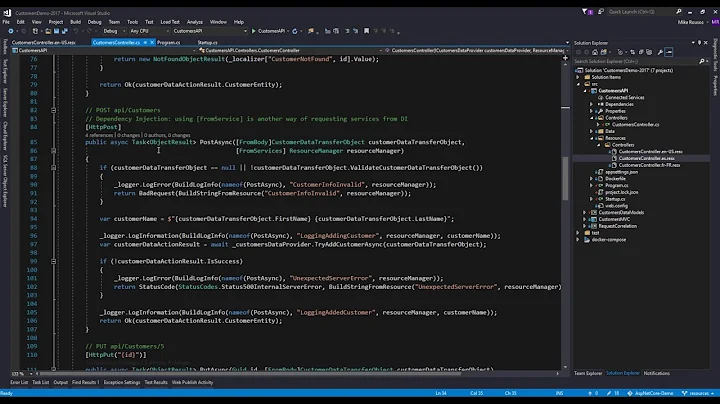Localization in external class libraries in ASP.NET Core
Solution 1
This is how I solved it. Thanks to Popa Andrei answer for directing me to the right place.
Class Library
Solution -> right click -> Add -> New Project ... -> .Net standard -> Class Library -> I used the name ResourceLibrary
ResourceLibrary
|- Resources
|----- SharedResource.resx
|----- SharedResource.he.resx
|- SharedResource.cs
SharedResource.cs code:
using Microsoft.Extensions.Localization;
namespace ResourceLibrary
{
public interface ISharedResource
{
}
public class SharedResource : ISharedResource
{
private readonly IStringLocalizer _localizer;
public SharedResource(IStringLocalizer<SharedResource> localizer)
{
_localizer = localizer;
}
public string this[string index]
{
get
{
return _localizer[index];
}
}
}
}
web application
Right click on webapp project -> Add -> Reference ... -> Check Resource Library
In your webapp startup.cs:
using ResourceLibrary;
...
public void ConfigureServices(IServiceCollection services) {
...
services.AddLocalization(o => { o.ResourcesPath = "Resources"; });
services.Configure<RequestLocalizationOptions>(options =>
{
CultureInfo[] supportedCultures = new[]
{
new CultureInfo("en"),
new CultureInfo("he")
};
options.DefaultRequestCulture = new RequestCulture("en");
options.SupportedCultures = supportedCultures;
options.SupportedUICultures = supportedCultures;
});
...
}
public void Configure(IApplicationBuilder app, IHostingEnvironment env)
{
...
app.UseRequestLocalization(); //before app.UseMvc()
...
}
Example use in controller:
using ResourceLibrary;
...
public class ExampleController : Controller
{
private readonly IStringLocalizer<SharedResource> _sharedLocalizer;
public EmailsController(IStringLocalizer<SharedResource> sharedLocalizer)
{
_sharedLocalizer = sharedLocalizer;
}
[HttpGet]
public string Get()
{
return _sharedLocalizer["StringToTranslate"];
}
View example:
@using Microsoft.AspNetCore.Mvc.Localization
@inject IHtmlLocalizer<ResourceLibrary.SharedResource> SharedLocalizer
<p>@SharedLocalizer["StringToTranslate"]</p>
Solution 2
You can store the .resx files on MyServices project and create a method for retrieving the resources based on keys.
In order to access the IStringLocalizer from MyServices you have to install Microsoft.Extensions.Localization.Abstractions nuget.
Basically localization configurations have to remain on MyWebApp (Startup class), but on MyServices you have to add that nuget for using IStringLocalizer and create a method like GetResourceValueByKey(key). This method can be called from wherever MyServices project will be referenced.
using Microsoft.Extensions.Localization;namespace GlobalizationLibrary { public class SharedResource:ISharedResource { private readonly IStringLocalizer _localizer;
public SharedResource(IStringLocalizer<SharedResources> localizer) { _localizer = localizer; } public string GetResourceValueByKey(string resourceKey) { return _localizer[resourceKey]; } }}
Solution 3
One typical solution is for your MyServices assembly to return resource keys (instead of returning the actual resources to be displayed on screen). You can have the .resx file as part of MyWebApp and have resource values for each resource key. This way, your MyService can be utilized by various UI apps each of which have their own resource representations.
Another approach would be to keep the .resx file as part of MyService itself. MyWebApp can load the other assembly and read the resource file from that.
Yet another option would be to keep the resources as a new assembly, and again load it from MyWebApp.
Check the following SO answers to get more details about how to do access .resx files from another assembly -
How can I read embedded .resx in different assembly
Access strings resources from embedded .resx in dll?
How to access another assembly's .resx?
Related videos on Youtube
Yurii N.
Updated on September 15, 2022Comments
-
 Yurii N. over 1 year
Yurii N. over 1 yearI have two projects:
- MyWebApp - ASP.NET Core Web API
- MyServices - .NET Core class library, which contains helpful services for project above
How can I add localization with
IStringLocalizerto MyServices? Where must be.resxfiles located? -
 Yurii N. almost 7 yearsAm I right, that putting
Yurii N. almost 7 yearsAm I right, that putting.resxfiles in the root of theMyServiceswould be enough? What do you mean by returning resource keys? -
ArunGeorge almost 7 yearsYes, that is right. If you check the Build Action of resource file, it will be is Embedded Resource by default. So it will be available whenever the dll loads.
-
ArunGeorge almost 7 yearsBy returning resource keys, I meant the following -> When you want to return an error message from MyServices, instead of returning the full message "An error occurred in feature x, situation y happened..", you just return a key (Something like Error1001 or ErrorFeatureXSituationY) from the MyServices assembly. Do not have any resource file attached within it. In MyWebApp, have a resource file which has a key Error1001 with the proper error message. This way, your resource file will only be in your MyWebApp.
-
 Yurii N. almost 7 yearsSeems interesting, but I need
Yurii N. almost 7 yearsSeems interesting, but I need.resxfiles to be included inMyServices, so I will try variant with files in a root! -
 Jenan almost 6 yearsWhy did you use ISharedResource?
Jenan almost 6 yearsWhy did you use ISharedResource? -
Shiran Dror almost 6 years@Jenan this is the standard pattern for dependency injections docs.microsoft.com/en-us/aspnet/core/fundamentals/…
-
 ibubi over 5 yearswhat about attribute based localizations? (data annotations on viewmodels or enums)
ibubi over 5 yearswhat about attribute based localizations? (data annotations on viewmodels or enums) -
 Soufien Hajji over 5 yearsGreat answer. I tried it and it worked with embedded resource build action, however it doesn't work with content build action. Can you give me an alternative to make this method work with content build action type ?
Soufien Hajji over 5 yearsGreat answer. I tried it and it worked with embedded resource build action, however it doesn't work with content build action. Can you give me an alternative to make this method work with content build action type ? -
Stef Heyenrath over 5 yearsThis solution and the listed links are not for DotNet Core.
-
user989988 over 5 yearsIs it possible to get ResourcePath inside :services.Configure<RequestLocalizationOptions>(options => { CultureInfo[] supportedCultures = new[] { new CultureInfo("en"), new CultureInfo("he") }; options.DefaultRequestCulture = new RequestCulture("en"); options.SupportedCultures = supportedCultures; options.SupportedUICultures = supportedCultures; }); ... }
-
c-sharp-and-swiftui-devni almost 4 years@SoufienHajji I tried this it refuses to work in 3.1 unless the resources our in the main assemlby any ideas.
-
 Metehan Mutlu almost 3 years@csharpdudeni77 Same Here. Any updates on this?
Metehan Mutlu almost 3 years@csharpdudeni77 Same Here. Any updates on this? -
c-sharp-and-swiftui-devni almost 3 years@MetehanMutlu why asking me i was not the orginal op
-
Benjamin Martin over 2 yearsHow can i use this in a separate Assembly for DTOs with DataAnnotations?
![Adding a Class Library | .NET Core 101 [5 of 8]](https://i.ytimg.com/vi/Jms3C-J-m2M/hq720.jpg?sqp=-oaymwEcCNAFEJQDSFXyq4qpAw4IARUAAIhCGAFwAcABBg==&rs=AOn4CLBp6kGBElSuuRP7aRRIkPHG3wn8XA)






